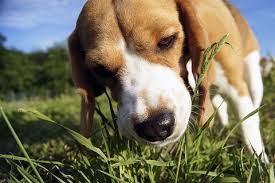
Hi Dr. Janeway,
Why does my dog Jack eat grass? I see him eating grass at least a couple times a week. A friend said this can mean he has a stomachache. Is that true? He is eating his kibble normally and no other issues.
Thanks,
Julie
Hi Julie,
Thanks for writing in! Grass eating in dogs is very common and is referred to as Pica. Pica is the technical term we use when an animal eats something like dirt, grass or even rocks. Pica is sometimes associated with a diet deficient in nutrients, vitamins, or minerals. However, if your dog is on a commercial diet it is very unlikely that he is deficient in any type of nutrients. So what other reasons are there for his culinary choice? Dogs may sometimes eat grass if they need fiber, if they are bored or have anxiety, or they may eat grass due to an underlying gastrointestinal issue. Keep reading, I’ll explain!
Domesticated dogs have adapted to living with humans over many years, but they still maintain some of their wild instincts. When dogs in the wild hunt an animal (usually an herbivore) they eat the stomach and gi tract that contains grasses and vegetation. Eating plant materials in the gi tract, or supplementing with grass helps them to balance their diet with fiber. Fecal sample studies have revealed that 11-47% of wolves eat grass. Dogs also maintain their instincts to scavenge, eating grass may be a residual instinct from their wild carnivore relatives. Grass eating might be instinctual or might be Jack’s way of ensuring he gets his daily fiber.
Another reason that domestic dogs might eat grass is boredom. If dogs are left outside without much environmental enrichment or company, they may resort to grass eating out of anxiety or boredom. Although providing other toys or stimulation is recommended, eating grass for behavioral issues will not usually cause an issue as long as they are routinely dewormed. When dog’s eat grass they might also eat internal parasites. Whipworm, hookworm and roundworms can live in the soil especially if contaminated with feces from other animals. It is recommended to consider a fecal test of your dog annually to ensure they are not afflicted with internal parasites, especially if they prefer to dine on fresh grass.
Lastly, dogs may eat grass if they have an underlying stomach or intestinal issue. Dogs with inflammation in their gi tract may develop an urge to eat grass in an attempt to “soothe” the discomfort in their abdomen. If you notice your dog routinely eating grass and vomiting, if he has diarrhea, or if he is not eating his usual food normally, he should come in to see me. Underlying issues like inflammatory bowel disease, gastritis, gastroenteritis and pancreatitis to name a few are all possible underlying issues we would need to rule out.
I hope this helps! I am not too worried about Jack if he is not showing any other clinical signs of gi discomfort. If he continues to eat grass routinely you should consider having a fecal sample checked for parasites.
Dr. Janeway is a veterinarian owner of Brighton Greens Veterinary Hospital in Grass Valley, near the fairgrounds. Your question could be the topic of next month’s article email your questions to us from our website: www.brightongreensvet.com
